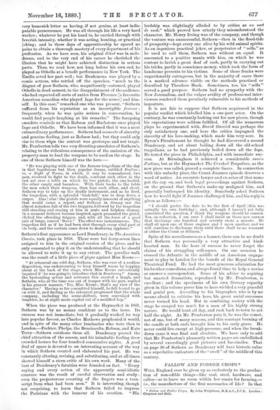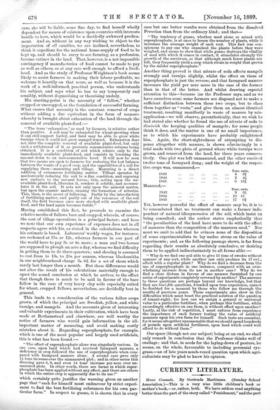FALLOW AND FODDER CROPS.*
WILL England ever be given up so exclusively to the produc- tion of non-edible things—like coal, steel, hardware, and calico—as to leave no room within her coasts for farming,- i.e., the manufacture of the first necessaries of life ? In that • Fallow and Fodder Crops. By John Wrightson, M.R.L.C., F.C.S. London : Chapman and Hall.
case, she will be liable, some fine day, to find herself wholly dependent for means of existence upon countries with interests hostile to hers, which would be a decidedly awkward predica- ment. And so, without in any way wishing to object to the
importation of all eatables, we are inclined, nevertheless, to
think it expedient for the national home-supply of food to be kept up, and should be sorry to see farming, as a profession, become extinct in the land. That, however, is a not impossible contingency if manufactories of food cannot be made to pay as well as others, or at any rate well enough to afford a liveli- hood. And as the study of Professor Wrightson's book seems likely to assist farmers in making their labour profitable, we welcome it heartily on that score, as well as because it is the work of a well-informed, practical person, who understands his subject, and says what he has to say temperately and sensibly, without dogmatising or theorising unduly.
His starting-point is the necessity of "fallow," whether cropped or uncropped, as the foundation of successful farming. What causes that necessity is the constant removal of crops without adding a due equivalent in the form of manure, whereby is brought about exhaustion of the land through the removal of available plant-food :—
" The term exhaustion,' as used by farmers, is relative rather than positive. A soil may be exhausted for wheat-growing when it can still support barley, and land may be able to grow white turnips when it could not grow mangel-wurzel. Exhaustion does not infer the complete removal of available plant-food, but only such a withdrawal of it as prevents remunerative returns being obtained. It is a condition of soil which relates only to the immediately available plant-food, and consists in lowering the amount down to an unremunerative level. It will now be seen that two means are open to farmers for restoring the lost balance between the wants of a good crop, and the capabilities of a soil for supplying them—manuring and tillage. Manuring is a direct addition of extraneous fertilising mater. Tillage operates by mechanically reducing the soil to a fine condition, and exposing new surfaces to the natural forces; this, acting upon the un- available plant-food, liberates it, renders it soluble, and accumu- lates it in the soil. It acts not only upon the mineral matter, but upon the organic matter, causing the formation of nitrates. This, then, is the secret of fallowing. Partly by the introduction of fertilising matter, and partly out of the resources of the soil itself, the field becomes once more stocked with available plant- food, and the land again becomes fertile."
Having established this fact, he proceeds to examine the relative merits of follows bare and cropped, wherein, of course, the cost of tillage operations is a principal factor; and here we note that our own experience of expenses does not in all respects agree with his, as stated in the calculations whereon his estimate is based. Labourers' weekly wages, for instance, are reckoned at Ils. or 12s., whereas farmers in our part of the world have to pay 3s. or 4s. more ; a man and two horses are supposed to plough an acre a day, whereas we find difficulty in getting them to do three-quarters; and shoeing is assumed to cost from to 13s. to 20s. per annum, whereas blacksmiths in our neighbourhood charge 3s. 6d. for a set of shoes which rarely last longer than a month. But these differences would not alter the result of his calculations materially enough to upset the sound conclusion at which he arrives, to the effect that though there is much to be said in favour of the bare fallow in the case of very heavy clay soils especially suited for wheat, cropped follows, nevertheless, are decidedly best in general.
This leads to a consideration of the various fallow crops grown, of which the principal are Swedish, yellow, and white turnips, and mangels. And the accounts given of interesting and valuable experiments in their cultivation, which have been made at Rothamstead and elsewhere, are well worthy the notice of farmers who would gain information in the all- important matter of manuring, and avoid making costly mistakes about it. Regarding superphosphate, for example, which is one of the most popular and largely used artificials, this is what has been found :—
" The effect of superphosphate alone was singularly various. In one case, upon land which had received farmyard manure, a deficiency in crop followed the 112113 of superphosphate when com- pared with farmyard manure alone. A second case gave only 11 tons increase over the unmanured plot; and in other series this dressing gave 5, 8, and even 14 tons' increase per acre over un- manured plots. In other words, there are farms in which super- phosphate has been applied without any effect, and there are others in which the entire crop is apparently due to its use !"
which certainly quite justifies the warning given on another page that "each for himself must endeavour by strict experi- ment to find the best fertilising substances for his own par- ticular farm." In respect to guano, it is shown that in every case but one better results were obtained from the dissolved Peruvian than from the ordinary kind ; and that-
" The tendency of guano, whether used alone or mixed with superphosphate, is at once to lessen the number of plants, while it increases the average weight of each root. This fact was con- spicuous to any one who examined the plants before they were weighed, and seems to show that while guano destroys the vitality of seed with which it comes in contact, it stimulates strongly the growth of the survivors, so that although much fewer plants are left, they frequently yield a crop which rivals in weight that grown by the milder superphosphate.'
Another thing proved is that nitrate of soda affects mangels strongly and turnips slightly, whilst the effect on them of superphosphate is just the reverse, and that farmyard manure increases the yield per acre more in the case of the former than in that of the latter. And whilst drawing especial attention to this—because (as the Professor says, and as we have ourselves seen) some farmers are disposed not to make a sufficient distinction between these two crops, but to class them together as "roots," and give them an almost identical treatment, resulting manifestly in waste of manure by mis- application—we will observe, parenthetically, that we wish he had stated also whether he found the use of nitrate of soda to diminish the keeping qualities of mangels; for some people think it does, and the matter is one of no small importance, as to which his experiments have probably enlightened him. Again, the short-sightedness of attempting to dis- pense altogether with manure, is shown cOnvincingly in a trial made with two plots of ground where white turnips were grown, and removed from the land, for three years consecu- tively. One plot was left unmanured, and the other received twelve tons of farmyard dung; and the weight of the respec-
tive crops was, unmanured,— Tons. out,.
1843 4 3t 1844 2 41 1845 0 13t Tons. cwts.
1843 9 91 1844 • - 10 15 1845 17 01 Yet, however powerful the effect of manure may be, it is to be remembered that no treatment can make a farmer inde- pendent of natural idiosyncrasies of the soil, which insist on being consulted; and the author states emphatically that "the peculiarities of the land have more to do with the effect of manures than the composition of the manures used." Nor must we omit to add that he evinces none of the disposition of some experimentalists to lay undue stress on the value of experiments ; and, as the following passage shows, is far from regarding their results as absolutely conclusive, or desiring them to be applied indiscriminately to all farms alike :—
"Why do we find one soil able to give 15 tons of swedes without manure of any sort, while another can only produce its 17 cwt., albeit with a regular plant ? Why do we find a decrease from the use of superphosphate in one instance, compared with an over- whelming increase from its use in another case ? Why do we find a clear dictum in favour of one manure furnished by one series of experiments completely reversed by another? The answers to these questions are perhaps beyond our knowledge, but that they are bond-fide questions, founded upon true experience, cannot be doubted for a moment by those who follow me through the results of previous years. These experiments also show us the difficulties which must beset the practical solution of the question of tenant-right; for how can we assign a general or universal value to a particular fertiliser, when perhaps this fertiliser, while exceedingly effective on one farm, is without effect upon another ? Lastly, at the risk of repetition, I must enforce from experience the importance of each farmer testing the value of artificial manures upon his own farm for himself. Such tests are essential, for it seems altogether unreasonable that we should spend hundreds of pounds upon artificial fertilisers, upon land which could well afford to do without them."
Our space (though not our subject) being at an end, we shall only remark in conclusion that the Professor thinks well of ensilage; and that, in seeds for the laying-down of pasture, he seems, on the whole, favourable to including perennial rye- grass,—an of late years much-vexed question upon which agri- culturists may be glad to know his opinion.



















































 Previous page
Previous page